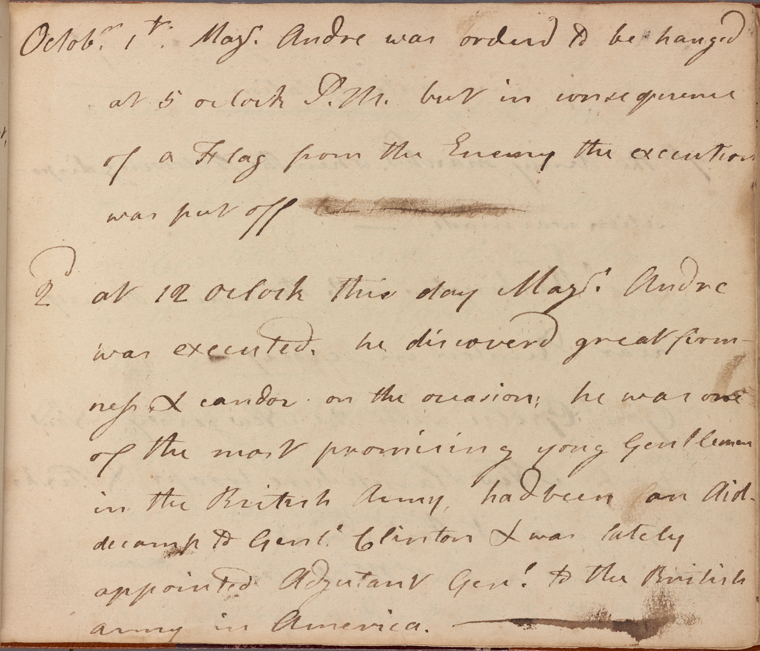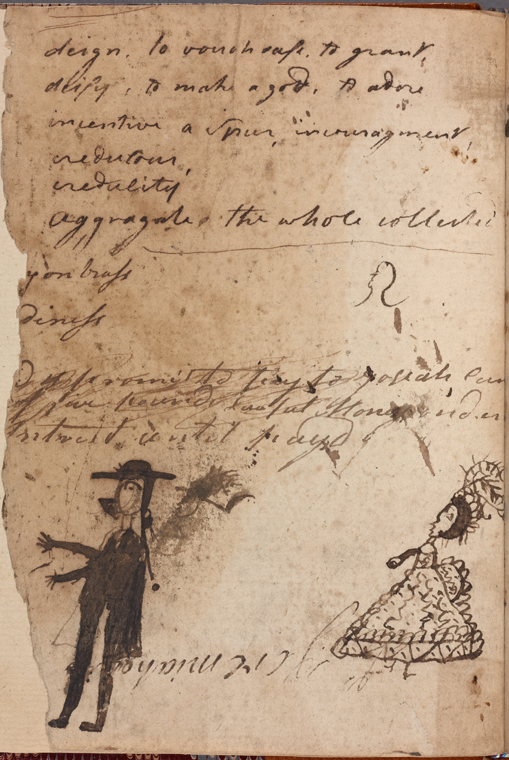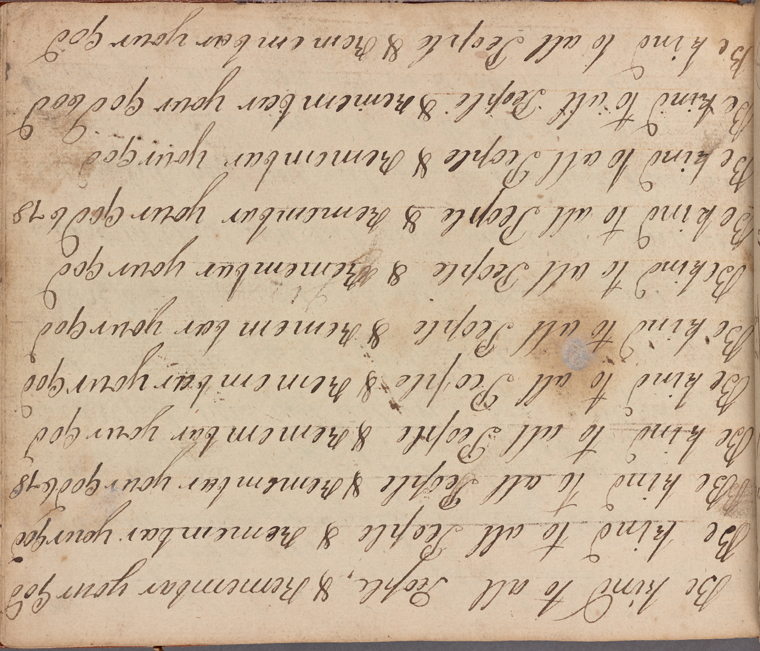Archives
Sympathy for a Spy
“Treason of the blackest day,” wrote Henry Dearborn in his journal, “is this day fortunately discovered.” American troops had captured British Army Major John André a few days before Dearborn took note of it in his journal, on September 25, 1780. André was the agent working with Benedict Arnold, the treasonous American general who planned to surrender West Point to British forces.

At that moment, André was the second most hated man in the United States. Only Arnold seemed more disdainful. Yet Dearborn, an officer in the Continental Army, mourned André. He described how André “discoverd[sic] great firmness & candor” as he faced his executioners. André, Dearborn noted, “was one of the most promising young gentlemen in the British Army.”

Dearborn found much to admire in André. He was cool and collected in the face of being hanged. He carried himself as a gentleman even in his final moments. The night before his execution, André even sketched a self portrait. That he could capably do that, especially at such a moment, only made him look more impressive.
Many other officers shared Dearborn’s sympathy for the executed spy. A few weeks after André was hanged, a letter ostensibly written by an American Army officer appeared in the October 25, 1780 issue of the Pennsylvania Gazette. “There was something singularly interesting in the character and fortunes of André. To an excellent understanding, well improved by education and travel, he united a peculiar elegance of mind and manners, and the advantage of a pleasing person. It is said he possessed a pretty taste for the fine arts, and had himself attained some proficiency in poetry, music and painting. His knowledge appeared without ostentation, and embellished by a diffidence that rarely accompanies so many talents and accomplishments, which left you to suppose more than appeared. His sentiments were elevated, and inspired esteem; they had a softness that conciliated affection.”
Why did these men so admire a British spy? The American officers were all gentlemen on the make. They wanted to be like André, to carry themselves as honorably, even in the face of extreme dishonor. These were men who wanted to distinguish themselves from their fellow citizens, and André embodied the European model of a gentleman to which they aspired.
Dearborn’s journal, which contains his firsthand account of the André’s capture and hanging, also reveals some of his own efforts at self improvement. Towards the front of the journal, Dearborn defined some words and also tried his hand at drawing. It is perhaps telling that on the first page of his journal/commonplace book, he defined the word "aggregate" as the "the whole collective" at the very moment that colonists first tried to join together as Americans.
Later in the book's life, it fell into the hands of Jeremiah Wakefield, a young man in Pittson, Maine. Wakefield's entries appear upside down online because he wrote in the book from the back to the front, effectively turning the volume around. He used the journal as a commonplace book, a sort of scrapbook in which one compiled quotes, letters, ideas, and knowledge of all sorts. These books were critical for people trying to improve themselves. Wakefield practiced his handwriting in his commonplace book, by repeatedly writing the phrase "Be kind to all People & Remember your god."
Henry Dearborn’s Journal has long been known as a valuable first hand account of service in the Revolutionary War, including accounts not only of André’s hanging, but also the decisive battle and siege of Yorktown a year later. Viewed as an artifact—as both a first hand account of famous moments, and a deeply personal tool for self-improvement—we can learn about Dearborn’s own ambitions, as well as Jeremiah Wakefield's. We can find an account describing a spy’s death, and see the author of the account trying to make himself more like that spy. We can understand how this man, and many other who risked their lives to secure their country’s independence, could find something to admire in a spy from an invading Army.
Further Reading
The original manuscript of the Henry Dearborn Journal is available online, along with all of the Library's Thomas Addis Emmet collection. On André's capture, hanging, and the reactions of American soldiers, see Robert E. Cray "Major John André and the Three Captors: Class Dynamics and Revolutionary Memory Wars in the Early Republic, 1780-1831,' Journal of the Early Republic 17 (Autumn 1997): 371-97; and Sarah Knott, "Sensibility and the American War for Independence," American Historical Review 109 (February 2004): 19-40. In 1798, William Dunlap wrote a sympathetic play about André's execution; William Dunlap, André; a tragedy, in five acts: as performed by the Old American Company, New-York, March 30, 1798. (New York: Printed by T. & J. Swords, 1798).
About the Early American Manuscripts Project
With support from the The Polonsky Foundation, The New York Public Library is currently digitizing upwards of 50,000 pages of historic early American manuscript material. The Early American Manuscripts Project will allow students, researchers, and the general public to revisit major political events of the era from new perspectives and to explore currents of everyday social, cultural, and economic life in the colonial, revolutionary, and early national periods. The project will present online for the first time high quality facsimiles of key documents from America’s Founding, including the papers of George Washington, Thomas Jefferson, Alexander Hamilton and James Madison. Drawing on the full breadth of the Library’s manuscript collections, it will also make widely available less well-known manuscript sources, including business papers of Atlantic merchants, diaries of people ranging from elite New York women to Christian Indian preachers, and organizational records of voluntary associations and philanthropic organizations. Over the next two years, this trove of manuscript sources, previously available only at the Library, will be made freely available through nypl.org.
Read E-Books with SimplyE
 With your library card, it's easier than ever to choose from more than 300,000 e-books on SimplyE, The New York Public Library's free e-reader app. Gain access to digital resources for all ages, including e-books, audiobooks, databases, and more.
With your library card, it's easier than ever to choose from more than 300,000 e-books on SimplyE, The New York Public Library's free e-reader app. Gain access to digital resources for all ages, including e-books, audiobooks, databases, and more.
If you don’t have an NYPL library card, New York State residents can apply for a digital card online or through SimplyE (available on the App Store or Google Play).
Need more help? Read our guide to using SimplyE.



Comments
Valiant Ambition by Nathaniel Philbrick
Submitted by Tony (not verified) on October 5, 2016 - 8:58am
Andre and his chief guard Jabez Huntington Tomlinsom
Submitted by David W Babington (not verified) on October 5, 2016 - 10:14am